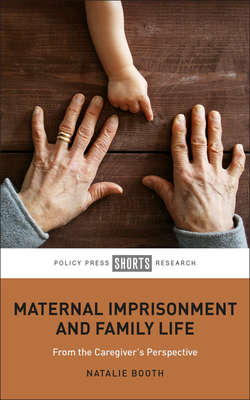Maternal Imprisonment and Family Life

Реклама. ООО «ЛитРес», ИНН: 7719571260.
Оглавление
Booth Natalie. Maternal Imprisonment and Family Life
Отрывок из книги
NATALIE BOOTH
MATERNAL IMPRISONMENT AND FAMILY LIFE
.....
An important consideration is the way in which families construct ‘new family obligations’ (Hairston, 2009: 10) following a mother’s prison sentence. Of particular interest is the impact on domestic, relational and emotional circumstances, as well as the shifting roles and responsibilities as family members adapt their everyday, family practices to respond to the changed circumstances (Morgan, 2011). This relates to both the short-term renegotiations immediately after the mother is imprisoned and to changes in the long term to account for the continued absence, the children’s shifting needs and the experiences of navigating around the criminal justice system. Likewise, most children move home when their mother goes to prison (Caddle and Crisp, 1997; PRT, 2018) but little is known about the household into which the children move, including the presence of other dependants, such as the caregivers’ own children. Thus, awareness of the wider familial context surrounding the mother’s imprisonment will also help to unpack the nature and scope of caregiving experiences within the wider family. This includes further exploration of the role and positionality of children’s fathers, who are poorly explored in discussions of caregiving in this context (Flynn, 2011), either as sole caregivers to children or as a potential form of support to other caregiving relatives (for example, grandmothers). For instance, it may be appropriate to question the relationship that the father of Linda’s grandsons might have, and what role he might assume in the absence of their mother (see the Preface).
Kin caregivers might have – or have had – a close relationship with the mother in prison. Research refers to the ‘double’ pains of grandparents raising grandchildren in the absence of their own children, whether a temporary or permanent loss, and for whom they are grieving (Selwyn et al, 2013; Raikes, 2016). For the children of prisoners, this loss has been conceptualised as ‘ambiguous’ (Bockneck et al, 2009) as their parents can be emotionally present while physically remote (Boss, 2016). As such, the emotionality of the loss and separation that may be experienced by caregiving kin is worthy of further exploration. The research conducted in the US by Turanovic and colleagues (2012) indicates that parent-caregiver relationships influenced childcare arrangements and practices, including the maintenance of contact. Indeed, several studies in the US have highlighted the caregiver’s role as a ‘gatekeeper’ or facilitator of mother–child contact due to their central role in enabling communication during the prison sentence (Barnes and Cunningham Stringer, 2014; Tasca et al, 2016). It is because of this critical role in maintaining mother-child contact that research with caregiving kin needs to capture nuances in interpersonal relationships and family dynamics, which, as Codd (2008) argues, are more suited to qualitative research methods.
.....